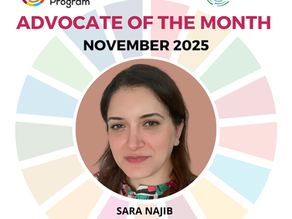SDG Brainstorm with Junior High School Students of Montessori de Manila, Philippines
- SDSN Youth

- Oct 29, 2021
- 2 min read
Updated: Oct 30, 2021
Written by Elizabeth Lerman and Fikayo Agha, Project Officers of the Global Schools Program, UN SDSN

It is no news that the world has nine years left until the achievement and implementation of the Sustainable Development Goals (SDGs). To come to this realization, it is important we recognize that the responsibility lies beyond governmental bodies; we all have a part to play.
On Friday, October 8th, 2021, Elizabeth and Fikayo, Project Officers of Global Schools, discussed with over 130 students the importance of the SDGs, sustainable lifestyles, and some of the most prominent global challenges. The students shared their views on local challenges across different communities in the Philippines and proposed ideas, activities, and lifestyles that they can take on as changemakers to address these challenges and create a sustainable future. Elizabeth and Fikayo were able to highlight the importance of understanding that the SDGs are all interconnected and indivisible and that the success or failure of one goal will undoubtedly affect others.

During the webinar, the students were able to identify major challenges faced by communities from all over the world which included: terrorism, climate change, and inequality. After some brainstorming, the students were able to highlight prevalent local challenges which include: poor education, corruption, hunger, and poverty.

The speakers enlightened the students about the current performance of their country in regards to the progress of the SDGs, and they also discussed how the Covid-19 pandemic has stalled the SDGs’ achievement. In hopes of inspiring the students to act, 3 examples of young changemakers from Nigeria, Sweden, and the US were discussed in order to showcase the ground-breaking impact that students are making in their local communities and in the world at large.


The dialogue continued on the ways in which the students can integrate lifestyle choices and everyday activities which promote the SDGs, even in lockdown / stay-at-home circumstances. Some of the highlighted activities include:
Recycling waste
Creating clothes, jewelry, crafts, pots, etc. out of used plastic.
Supporting organizations that collect plastic and other waste to build cement and walls.
Tree planting
Maintaining the home and school gardens, plotting plants within the home, and planting trees within the community.
Community clean-up
Organizing clean-ups with schools and non-profit organizations.
Cleaning up neighborhoods during daily walks.
Sustainable lifestyles
Using less energy at home, driving less, eating less meat and dairy, managing groceries to only buy what you can consume, and using less one-time-use packaging.
Actions on SDG 4: Quality Education
Donating used books, school materials, technology to public libraries, and youth centers.
Teaching immigrants or those less privileged the local languages
Joining non-profit organizations that help address quality education by promoting girls’ school attendance, offering free financial literacy/technology classes, etc.

At the end of the webinar, the speakers encouraged the students to come up with an SDG pledge which signified their commitment to taking actions on the SDGs and living sustainable lifestyles. It was wonderful to see the students engaging, sharing their ideas, and asking meaningful questions to motivate each other, their teachers, and surrounding communities. There were two main takeaways of the event for the students:
Change starts with you
Think big but start small
Thank you to Global Schools for this opportunity and thank you to the students and faculty at Montessori de Manila for the warm welcome and sincere appreciation.
Writers: Fikayo Agha and Elizabeth Lerman
(Project Officers, Global Schools)

















Comments